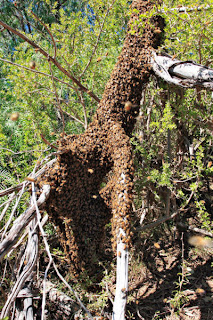 Did you see 60 Minutes last night. Wow! They did a incredible piece on the mysterious dwindling of our region’s bee populations. What a fascinating, yet baffling, conundrum. Apparently, 90% of the beehives kept by professional beekeepers are dying out, or the bees are leaving, never to return, a rarity among honeybees, which are a eusocial community (specialized workers labor for and protect the reproductive queen). The bee’s labors are primarily gathering nectar and in turn pollinating the earth’s plants species. They don’t often leave their own.
Did you see 60 Minutes last night. Wow! They did a incredible piece on the mysterious dwindling of our region’s bee populations. What a fascinating, yet baffling, conundrum. Apparently, 90% of the beehives kept by professional beekeepers are dying out, or the bees are leaving, never to return, a rarity among honeybees, which are a eusocial community (specialized workers labor for and protect the reproductive queen). The bee’s labors are primarily gathering nectar and in turn pollinating the earth’s plants species. They don’t often leave their own.
According to the report, one third of our entire food source comes from produce dependent on bee pollination, so, naturally, it presents quite a problem that so many bees seem to be disappearing. Although it is as of yet unknown what is causing the diminishment of the bee population, experts believe that it has to do with pesticide use, viruses, and plain old bee stress that’s leading to the rapid demise of our most crucial allies.
As I point out in my upcoming book–The Six Keys To Optimal Health—pesticides are not only poisonous to man, they are toxic to many other useful species, including bees. Limiting our use of poisonous pesticides would certainly decrease our own health risks, but it might also help preserve some of the other precious lifeforms on this planet. Obviously, completely abandoning the practice of crop spraying is not practical–not economically, and not from the standpoint of providing food for the entire country. However, we can try to purchase more locally grown, organically farmed produce. That, at least, would lessen the need for massive crop spraying a little, you know?
What I found most interesting in the piece was that leading experts pointed out that bee populations are dwindling due to major stress. Honeybees are overworked–transported across country in trucks (I swear; check out the piece here) to pollinate a bevy of crops–usually feeding on a sole food source, and subjected to serious toxic exposure. Their weakened immune systems lead to their susceptibility to viral infections, and indeed, that’s what autopsies of dead bees has shown, major viral infestations. But as scientists point out, viruses are unlikely to be the primary cause of illness; more likely, bees are succumbing to opportunistic parasites which are able to thrive due to the bee’s weakened compositions.
Sound familiar? Yes, it’s exactly what happens to us when our bodies become weak due to the stresses of our lifestyles; we also become susceptible to illness under these conditions. It’s a universal theme. Dr. Marla Spivak, the foremost authority on honeybees in this country, confirms that stress plays a major part in the lives of honeybees. According to Dr. Spivak, “They mirror us. We have a really close association with bees. They reflect what we are doing.” In other words, their stressors are some of the same things we expose ourselves to on a daily basis.
So there you have it–watch the bees. What they’re experiencing is what we’re also going through, just on a larger scale. The extensive disappearance of bees is a good sign that it’s time to change. Let’s hope that we can start making the necessary changes before something drastic happens.












